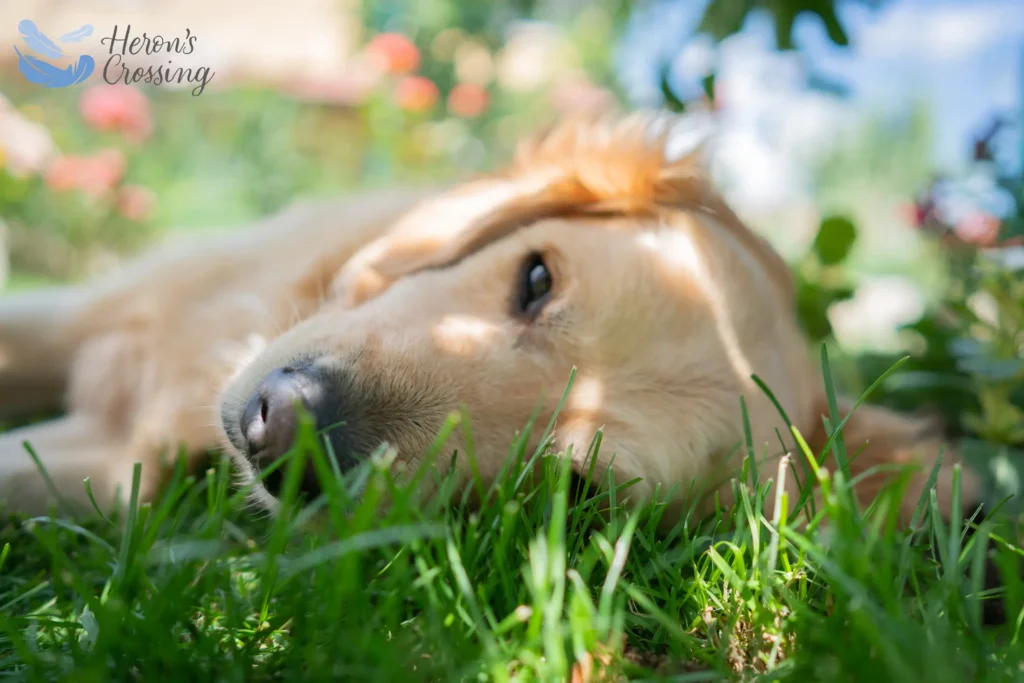Every time your dog steps outside, he’s exposing himself to whatever is on the ground. Chemicals and some nasty natural substances can cling to fur and paws. You may find him licking his fur or his feet, swallowing whatever he has tracked.
Everyone likes a green lawn, but fertilizers, weed control and pesticides can cause an upset stomach, allergies or much worse, depending on how much your dog ingests.
Professional applications are stronger than those sold over the counter, so if you use a lawn service, great care must be taken to keep your dog away from these treated areas for several hours after an application, until the treatment is fully soaked in and dried.
If your pet gets a runny nose and eyes, skin breakouts, coughing or sneezing, it may be spring pollen, but mild exposure to these chemicals can cause similar effects, so watch your dog carefully to make sure symptoms don’t increase beyond a little mild discomfort.
Signs of poisoning to watch out for are drooling, vomiting and diarrhea, dilated pupils or pupils that are not the same size, difficulty breathing, agitation, numbness, walking strangely, paralysis, seizure, collapse or worse. It’s time to get your dog to the vet immediately. If the poisoning is from a home application, bring the container or take a photo of the list of ingredients for your vet to read.
The National Pesticide Information Center reminds us to remove, not only our pets, but anything in the yard that our pets use, such as bowls, toys and bedding, before an application.
Wet applications take several hours to dry. Dry granules present a greater problem because they can get stuck between your pet’s toes and be swallowed whole while grooming himself sometime later. Also watch out for your pet eating treated grass, plants or dead bugs after any application. It’s always good to have pet wipes at the door to clean off your dog’s feet after being outside, in addition to a floor mat at the door that will help to dislodge and collect anything from between the toes.
If you have questions about any pesticides, you can call the National Pesticide Information Center (NPIC) at 800-858-7378. They work with the US Environmental Protection Agency (EPA), and keep a running study of reported pet incidents.
The EPA also has online resources for learning more about pesticide use around pets. They remind us to consider the safety of wildlife, and to look for the ‘EPA Safer Choice’ label on products that they have deemed less harmful, although still not completely safe.
The ASPCA reports pesticide or fertilizer ingestion as one of the top 10 pet poisoning issues. If you have any concerns about how your pet is doing, it’s best to call your vet or the ASPCA Poison Hotline at 888-426-4435.
As a general reminder, anything that says ’natural’ or organic’ doesn’t necessarily mean that it’s safe for animals. Always read the full label. Some of these labels include a pet emergency poisoning number, which is a hint that they have already had issues. Some fertilizers are advertised as pet-friendly. This may only mean that they dry faster.
Are there any truly natural substitutions that are completely animal-safe? For centuries farmers have been using other means, like vinegar for weeds and compost as fertilizer, and certain soaps and plants that drive bugs away.
Before treating your yard for the spring, it might be interesting to take your pup for a country drive and stop by a farmers supply store to get some suggestions from people who may treat crops and fields with substances that are not harmful. Real country stores often welcome your leashed dog, and it would be a big adventure for him. Just check with the stores in advance.
Heron’s Crossing provides end-of-life care for pets in the Metro Atlanta area. In-home appointments with compassionate vets are available. If you’d prefer a home-like setting away from your home, our Decatur office is also available by appointment.

